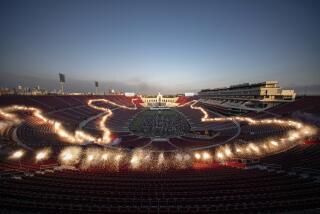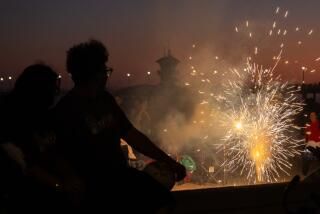In China, smog woes eroding new year fireworks tradition
- Share via
BEIJING — Flowers to mark the new year? How about electronic gizmos that flash and go bang?
Fireworks are as integral to Chinese New Year as evergreens are to Christmas. Tradition holds that noisy pops and colorful flares ward off evil spirits and bring good luck for the coming year.
But the pyrotechnics also release particulates that include sulfur dioxide and other toxins.
With smog blanketing many Chinese cities as the Year of the Horse approaches, environmental activists, meteorologists and government officials are urging people to start the new year without a bang Friday. And people appear to be listening.
Even without New Year’s fireworks, winter is a particularly bad time for air quality in China, especially in northern areas where coal-fired heating is common. In December, China’s Environmental Protection Ministry reported that 62 of 74 cities it monitors failed to meet air quality standards for more than half the month.
Beijing’s municipal government sent text messages Wednesday to many cellphones in the city, urging people to set off fewer fireworks or none at all. Two years ago in the capital, levels of tiny particulates known as PM 2.5 rose to an hourly figure of 1,486 micrograms per cubic meter, state media reported. In comparison, on Jan. 1, the worst day in the Los Angeles area this month, hourly levels of fine particles reached 220 micrograms per cubic meter. U.S. health standards say those concentrations should not exceed an average of 35 micrograms per cubic meter over a 24-hour period.
Starting Thursday, the China Meteorological Administration will begin using a daily four-alert fireworks index tied to smog levels in some cities. When the index hits the highest, or red, level, the public will be advised not to light any fireworks, the official New China News Agency said.
Several cities have curtailed the number of days that residents are allowed to use fireworks. Chu Xumin of the environmental group Green Zhejiang in eastern China noted that the city of Hangzhou has issued a regulation permitting fireworks on only three days during the weeklong holiday, down from an 18-day period in 2013. The city also canceled its autumn fireworks festival.
Through social media networks and via op-ed articles in local newspapers, Green Zhejiang has been urging people to curb their use of pyrotechnics.
“We want to promote a culture of individual responsibility, of doing little things that can help create better air quality,” Chu said. “So driving less, smoking less, fewer fireworks.”
More and more people are cooperating, Chu believes. “People are very aware of what’s going on,” he said.
A survey by the Shanghai Municipal Statistics Bureau found that 81% of city residents supported a total ban on fireworks and that 85% said they were not buying any this holiday season.
Jia Lin, 26, was shopping Wednesday at a roadside fireworks stand in central Beijing. Many of the packages’ labels boasted that they produced “less smoke,” but bore warnings on the back that they pollute the environment.
After perusing packages labeled “Happy Panda,” “America’s #1 Tanks” and a set called “I Love the Diaoyu Islands,” a reference to territory claimed by both China and Japan, she settled on just a few simple packs of firecrackers.
“We are doing less this year,” Jia said. “When my aunt heard I was going to buy fireworks, she told me, ‘Don’t buy too many.’ My friends have been circulating messages on social media for months about this.”
In addition to urging people to cut down on their use of fireworks, Chu’s group is also promoting “e-fireworks,” electronic devices that go bang like a real pyrotechnic and emit a flash of light, but don’t produce any smoke.
Jia said she’d consider using those if access “was as easy as this stand.” But a clerk at the stand dismissed the idea that they could replace the real pop of a Happy Panda or America’s #1 Tanks, which actually look like miniature armored vehicles.
“It’s meaningless,” the clerk said. “It’s just like playing a recording.”
The Beijing Consumers Assn. has suggested flowers as another possible alternative to fireworks.
In an editorial, the state-run China Daily newspaper said customs must adapt to the modern, polluted age.
“Some may argue that burning firecrackers is a traditional part of Chinese culture. But culture derives from life and changes with the times,” the paper opined. “Since we have been choking on the smog that at times makes people only yards in front of us almost invisible, it should be common sense that we express our joy and wishes at the new year without coughing and sputtering on the aftereffects of fireworks.”
Times staff writer Tony Barboza in Los Angeles contributed to this report.
More to Read
Sign up for Essential California
The most important California stories and recommendations in your inbox every morning.
You may occasionally receive promotional content from the Los Angeles Times.











